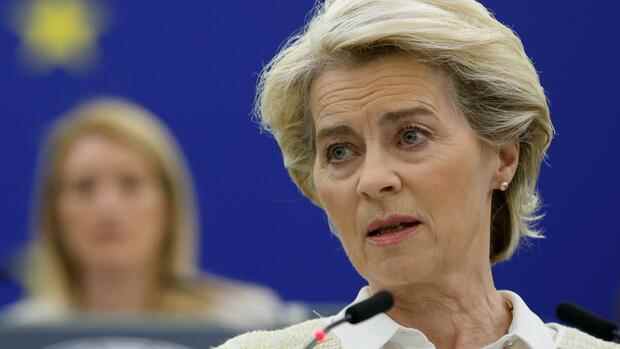The EU Commission President wants to convince the Hungarian President of an oil embargo against Russia.
(Photo: AP)
Brussels The proposal for a new sanctions package against Russia has met with significant resistance. The fact that it will be politically difficult to implement the punitive measures is shown by a spontaneous visit by Commission President Ursula von der Leyen to Budapest on Monday afternoon. The topic of the talks in Hungary is the security of European energy supply, wrote the spokesman for the Commission President.
Von der Leyen himself tweeted after the meeting with Prime Minister Viktor Orban that the exchange had been helpful in clarifying issues related to sanctions and energy security.
Progress has been made, but more work is needed.
Hungary has so far slowed down the oil embargo by pointing out that it is dependent on Russian oil. Foreign Minister Peter Szijjarto compared the proposal to a “nuclear bomb dropped on the Hungarian economy”. According to the commission, the country should be allowed to purchase Russian oil by the end of 2024, as should Slovakia. An exception is planned for the Czech Republic until mid-2024.
Since Monday, Bulgaria has also been asking to be exempted from the embargo. The country will veto without exception, said Deputy Prime Minister Assen Vasilev. The Burgas refinery still needs time to expand its desulfurization in order to be able to switch entirely to non-Russian oil. However, Wassilew was optimistic that an agreement would be reached.
Top jobs of the day
Find the best jobs now and
be notified by email.
The EU Commission’s draft stipulates that most EU countries will no longer import oil by the end of the year. Hungary, the Czech Republic and Slovakia are heavily dependent on Russian oil, all of which is supplied via the “Druschba” (Friendship) pipeline, which also supplies eastern Germany.
In addition to the exceptions for individual states, the measures intended to ensure that Russia does not sell its oil on other markets are also controversial. For example, it was envisaged that European ships would no longer be allowed to transport Russian oil. According to the Bloomberg agency, a compromise could amount to overturning this rule. Greece had insisted on this. The ban on insuring Russian oil tankers is to remain in place, according to Bloomberg.
A new compromise could be presented during Tuesday, it said. A spokesman for the Federal Foreign Office was still optimistic on Monday that an agreement would soon be reached.
Meanwhile, the G7 countries agreed on Sunday to stop purchasing Russian oil in the future. “We will ensure that we do so in a timely and orderly manner, in a manner that gives the world time to secure alternative supplies,” they said.
While France, Italy and Germany are working on the exact exit conditions within the EU, the USA, Canada and Great Britain have already decided to stop exports.
The G7 decision is therefore particularly relevant for Japan. “It is an extremely difficult decision for a country that is largely dependent on imported energy, including oil,” said Japanese Prime Minister Fumio Kishida. “But the unity of the G7 is most important at the moment.” The exit should be gradual and slow. In addition, they want to continue importing oil and gas from sources within Russia in which they themselves have a stake.
More: New sanctions before Putin’s appearance – “There will be no retreat for the Russian economy”
